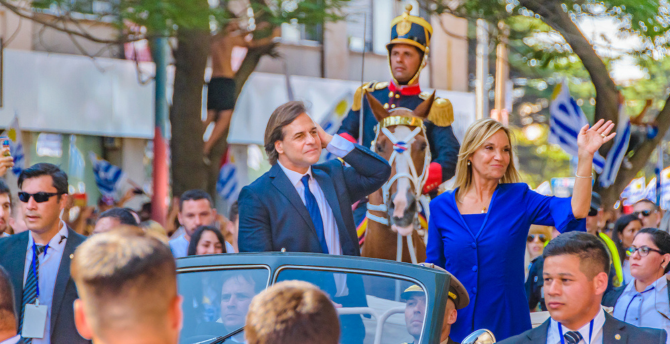
Roberto Salinas León | Director, Center for Latin America
Gonzalo Schwarz | President & CEO, Archbridge Institute
This commentary originally appeared in News Americas News Network on May 14, 2021. Photo: Uruguayan President Luis Lacalle Pou Herrera and Vice President Beatriz Argimon at the assumption parade in Montevideo.
In April of 2020, The Economist’s Bello column controversially proclaimed that it should be “Latin American liberalism´s hour.” Bello columnist Michael Reid meant a set of ideas emphasizing justice systems that check power and privilege; equality of opportunity before the law; tolerance instead of bigotry, and science instead of ideological “quackery.”
Yet, one year later, the prospects for such liberalism seem dim. Governments of all political stripes have seized the day to implement highly authoritarian measures, with growing restrictions on human action precluding regular citizens from earning an honest living. Most countries witnessed how the COVID-19 pandemic completely overwhelmed weak health infrastructures. Moreover, corruption and a short-term outlook led to graft, secondary markets for suddenly vital goods such as masks and oxygen tanks.
This has continued throughout the region’s vaccination campaigns, whereby vaccine rollouts have been beset with corruption (notably in Argentina, Perú, and Bolivia) and even political manipulation – “vote for me, who made your vaccine possible and free.” (Mexico is a sad and salient case in this regard.)
At a time when a “simple rules for a complex world” approach has become the difference between getting ahead or facing chronic economic duress, most Latin countries have failed to adopt more flexible stances in their labor markets, thereby stifling entrepreneurial drive and an opportunity for a faster rebound in the post-pandemic stages of economic recovery. Latin America faces another “lost decade.”
Based on a recent report, Latin American economies suffered an average annual GDP contraction of 8.5 percent in 2020—the worst economic performance across all emerging markets. The decrease in economic output adversely affected employment, with the average unemployment rate increasing by 4.4 percentage points relative to pre-COVID levels. More than 12 out of 100 people in the region’s labor force cannot find a job.
Liberal ideas in the region have been undermined by chronic macroeconomic mismanagement. Hard-won victories over the ghosts of runaway inflation and currency depreciation have dissipated, in the face of rapidly growing balance sheet deterioration and the sudden need for massive fiscal expansion to finance stimulus programs. Some countries, such as Argentina and Venezuela, had already become victims of “easy money” policies.
On the political front, electoral preferences continue to fall to a rising tide of illiberal populism, with the return of MAS in Bolivia, the chaotic uncertainty in Peru occasioned by the prospect of Pedro Castillo assuming office, and the deconstruction of institutions and centralization of power launched by AMLO in Mexico. Yet, contrary to the “good times” of high commodity prices and the bonanza of the 1990s and 2000s, there are no safety valves or magic wands available to save the day. The flow of remittances has enabled some countries to extend financial oxygen, and mitigate the economic collapse of double-digit contractions throughout the region, but that too is limited.
This is precisely where liberty—with an emphasis on competition, open markets, and integration into global supply chains—would make a key difference at a critical time. This is not about resurrecting misleading and pejorative labels such as “neo-liberalism” (whatever that means), but about emphasizing how local communities can prosper with global trade and open investment in all sectors of the economy. Red tape, rent-seeking, and bureaucratic strongholds suffocate everyday citizens’ effort to persevere, and will only increase the cost of getting ahead.
There are notable examples that shine light on those flames of liberty that the Bello column suggests need rekindling. Last year’s presidential election victory of Luis Lacalle Pou in Uruguay and the recent victory of Guillermo Lasso in Ecuador suggest a potential shift to more classical liberal regimes across the hemisphere. But such political victories are meaningless if unaccompanied by noticeable improvements in living standards.
The example of the half-way, short-lived experiment of liberalism in Argentina with Mauricio Macri is a powerful warning sign to many of the new leaders in the region. The failure to enact structural reforms that carried popular downside at the beginning of its government but would have yielded noticeable improvement towards the end of the term, led to the return of populist “kirchnerismo” in Argentina.
Latin America needs to transcend autocratic “caudillos” promising everything out of nothing and think hard about how to spur social mobility and inclusive prosperity in the region. For too long, the focus has been on social plans and the vanity of wiping out income inequality, instead of reliable long-term approaches to reducing poverty by removing bureaucratic barriers to entrepreneurship and innovation.
Because of Latin America’s untapped economic potential, hope remains. The region has seen darker times, and now is the time for Latin America to value the freedom to choose. Once rekindled, liberalism could mean that more people across the Americas aspire to live better, richer, and fuller lives.
Latin American liberalism’s hour is still now.